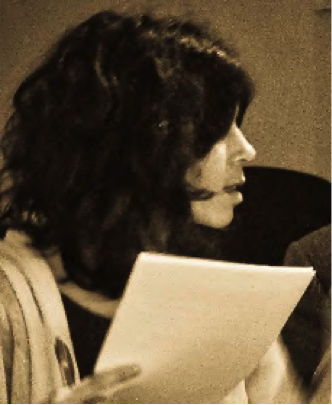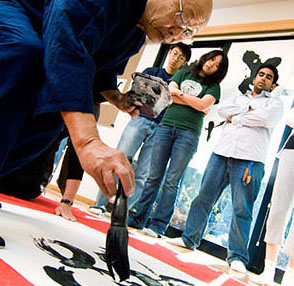Inequality & Cultural Understanding
Concern over rising inequality increasingly dominates today’s political debates—in the US and elsewhere. Not just an issue of rich and poor, inequality is part and parcel of gender, racial, and national divisions. Though systems that produce unequal results can sometimes seem natural and inevitable, inequality is the product of our societies’ past choices—even as such choices threaten the underpinnings of democratic society. This grand challenge learning pathway draws on the cross-disciplinary resources of a public research university to enable students to explore the cultural, economic, social, and political roots of inequality. As students develop a multi-dimensional grasp of the causes and consequences of this topic, they will develop the resources, skills, and inspiration necessary to envision and enact a more just and equitable future.
Leadership
Executive Co-Chair, Terri Weissman
 Terri Weissman teaches Modern and Contemporary Art and the History of Photography in the College of Fine & Applied Arts. She is the author of The Realisms of Berenice Abbott: Documentary Photography and Political Action (UC Press 2011), and co-author of American Modern: Documentary Photographs by Abbott, Evans, and Bourke-White (UC Press, 2010). Her articles and reviews have appeared in journals such as Visual Resources, ArtNexus, SCOPE, Media-N and Third Text. Her essay “Freedom’s Just Another Word,” appears in Contemporary Art: 1989 to the Present (ed. Alexander Dumbadze and Suzanne Hudson), and relates to her current project, tentatively titled, This is What Democracy Looks Like: Freedom, Action and Revolutionary Dreams. Her scholarship addresses how different kinds of images (e.g. in the media, in galleries, in films) affect political discourse and people’s opinions about social issues, such as inequality.
Terri Weissman teaches Modern and Contemporary Art and the History of Photography in the College of Fine & Applied Arts. She is the author of The Realisms of Berenice Abbott: Documentary Photography and Political Action (UC Press 2011), and co-author of American Modern: Documentary Photographs by Abbott, Evans, and Bourke-White (UC Press, 2010). Her articles and reviews have appeared in journals such as Visual Resources, ArtNexus, SCOPE, Media-N and Third Text. Her essay “Freedom’s Just Another Word,” appears in Contemporary Art: 1989 to the Present (ed. Alexander Dumbadze and Suzanne Hudson), and relates to her current project, tentatively titled, This is What Democracy Looks Like: Freedom, Action and Revolutionary Dreams. Her scholarship addresses how different kinds of images (e.g. in the media, in galleries, in films) affect political discourse and people’s opinions about social issues, such as inequality.
Advisory Co-Chair, Kevin Jackson, Accountancy (Business)
Advisory Co-Chair, Lauren Goodlad, English/Unit for Criticism (LAS)
Spring 2016 Grand Challenge Experience Courses (GCXs)
GCL 137a DOCUMENTING INEQUALITY (Art), Terri Weissman, TR 2-3:20PM
Through the study of documentary film, photography and other kinds of socially conscious art, this course explores how economic and social inequality affects the lives of children and minors in the U.S. Students will watch and critique documentaries made by artists and filmmakers in the areas of Education, Housing, and Law Enforcement; they will go behind the scenes at the Krannert Art Museum in order to investigate the museum's documentary holdings; and they will make their own documentary projects. Final projects will be exhibited in the Krannert Art Museum at the end of the semester.
GCL 137a DOCUMENTING INEQUALITY (Art), Ryan Griffis, TR 2-3:20PM
Through the study of documentary film, photography and other kinds of socially conscious art, this course explores how economic and social inequality affects the lives of children and minors in the U.S. Students will watch and critique documentaries made by artists and filmmakers in the areas of Education, Housing, and Law Enforcement; they will go behind the scenes at the Krannert Art Museum in order to investigate the museum's documentary holdings; and they will make their own documentary projects. Final projects will be exhibited in the Krannert Art Museum at the end of the semester.
GCL 145 Interdisciplinary Approaches to Social Justice (Art) (multi-section first-year course)
GCL 145 IASJA: BLACK MUSIC AND SOCIAL JUSTICE (Art/US Minority Cultures), John Paul Meyers, MW 2-3:20PM This course explores how African American musicians have used music to accomplish political tasks, including raising awareness, creating a sense of community, and directly lobbying for political and social change. Moving chronologically from music in Abolition to the Black Lives Matter campaign, we will critically examine the successes and failures of these movements and the ways in which they deployed music. An important part of the course will be engaging with a contemporary movement for social justice, either as scholar-observers or as participants.
GCL 147 Interdisciplinary Approaches to Social Justice (Social Science) (multi-section first-year course)
GCL 147b IASJS: RACE AND THE CITY (Social Science/US Minority Cultures), Ken Salo, TR 3:30-4:50PM
Through studying state led spatial or urban planning policies, projects and practices we will explore how cities, here and abroad, shape and were shaped by intersecting socio-economic inequalities of race, class and gender. Students will, in person and virtually, walk and talk with especially inner city residents to document how they challenge and sometimes change persistent political policies that racially re-segregate urban from suburban neighborhoods. Specifically, students will work with neighborhood residents to map their struggles against spatial segregation and social inequality. Final mapping projects will be shared online with residents at the end of the semester.
GCL 147c IASJS: POLICING, CULTURE & INEQUALITY (Social Science/US Minority Cultures), Jeff Martin, MW 2-3:20PM
Students in this course will study the ways police are represented in American culture, and explore how these representations reflect social reality. As an experiential course we will work with materials gathered from our cultural environment, including film, television, internet, observation, and interviews. Students will use the materials they gather to create curated multi-media collections designed to showcase the ways in which American police reflect the inequalities of the social order they uphold.
GCL 147d IASJS: SOCIAL JUSTICE AND THE MEDIA (Social Science/US Minority Cultures), Isabel Molina-Guzmán, MW 10-11:20PM
Students in this course gain critical media literacy skills through exploring contemporary social justice issues in the media ranging from Black Lives Matter to sexual assault on college campuses to immigration politics among other topics. The course applies the knowledge learned in the course to the UIUC campus through campus organizations impacted by these contemporary social justice issues. Throughout the semester students will work with these organizations to develop digital media projects that help to raise Campus awareness or work to engage students in Campus advocacy.
GCL 148 Interdisciplinary Approaches to Social Justice (Historical Perspectives) (multi-section first-year course)
GCL 148 IASJH: THE GLOBAL DIVIDE (Historical Perspectives), Emanuel Rota, TR 3:30-4:50PM
We are equal before the law, but what about the rest of our lives? Is economic inequality bad? Is international inequality more acceptable than national inequality? We will study the history of the justifications for inequality in light of what economists, sociologists and philosophers think, today, of inequality. By the end of the course, you will be able to engage the major arguments in support of inequality knowing their history, their weaknesses, and their relation to the larger historical context. We will study inequality and its justifications as some of the crucial pillars of political conflicts and we will learn how the notion of inequality changed over time. We will interview economists, sociologists and other experts to learn what the current debate is. A final undergraduate conference/debate will allow us to test the quality of our work and face the experts with informed and difficult questions.
GCL 195 Fictions of Equality (Literature) (multi-section first-year course)
GCL 195a Fictions of Equality: MARRIAGE EQUALITY (Literature), Julia Saville, TR 2-3:20PM
Through novels, poetry, memoirs, and films students will explore marriage in terms of the power dynamics that have defined marital relationships in various periods and cultures--from Jane Austen’s Britain to multicultural London, to marriage equality for gays and lesbians in the contemporary U.S. Using the library's rare books archives they will see how young couples found one another in Austen’s time and explore records of domestic violence in the Victorian era. Guest speakers on contemporary marriage equality will include a local Family Court judge. Students will use their ePortfolios to translate their archival work into a capstone research project.
GCL 195b Fictions of Equality: WHERE IS THE GOOD LIFE? (Literature), Elena Delgado, TR 11-12:20PM
Through the study of diverse texts (fiction, film, popular songs, documentaries), students in this course will explore how the concepts of “the good life” and the “American dream” are interpreted and fulfilled by different social groups and in different cultural contexts. Students will also get to explore personally, and reflect upon, evolving and persistent inequalities in our own community of C-U, including transportation and housing challenges faced by immigrants or the working poor.


